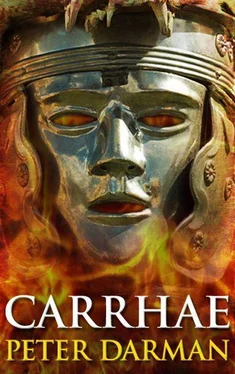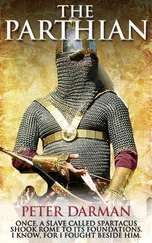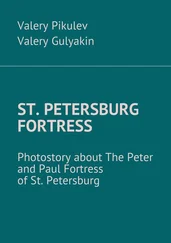Peter Darman - Carrhae
Здесь есть возможность читать онлайн «Peter Darman - Carrhae» весь текст электронной книги совершенно бесплатно (целиком полную версию без сокращений). В некоторых случаях можно слушать аудио, скачать через торрент в формате fb2 и присутствует краткое содержание. Год выпуска: 2013, Жанр: Исторические приключения, на английском языке. Описание произведения, (предисловие) а так же отзывы посетителей доступны на портале библиотеки ЛибКат.
- Название:Carrhae
- Автор:
- Жанр:
- Год:2013
- ISBN:нет данных
- Рейтинг книги:3 / 5. Голосов: 1
-
Избранное:Добавить в избранное
- Отзывы:
-
Ваша оценка:
- 60
- 1
- 2
- 3
- 4
- 5
Carrhae: краткое содержание, описание и аннотация
Предлагаем к чтению аннотацию, описание, краткое содержание или предисловие (зависит от того, что написал сам автор книги «Carrhae»). Если вы не нашли необходимую информацию о книге — напишите в комментариях, мы постараемся отыскать её.
Carrhae — читать онлайн бесплатно полную книгу (весь текст) целиком
Ниже представлен текст книги, разбитый по страницам. Система сохранения места последней прочитанной страницы, позволяет с удобством читать онлайн бесплатно книгу «Carrhae», без необходимости каждый раз заново искать на чём Вы остановились. Поставьте закладку, и сможете в любой момент перейти на страницу, на которой закончили чтение.
Интервал:
Закладка:
Soon after the gathering at Ctesiphon Orodes mustered an army and invaded Gordyene to topple Surena. The latter rode out of his capital and gave battle in the valley before Vanadzor, leading a frantic charge in an effort to kill Orodes. But the cataphracts of Susiana, Hatra and Media cut down Surena and his army dissolved. The man who had been my squire joined in the afterlife the wife whose death had broken his heart. I did not blame Orodes for dealing with Surena in the way he did. His actions earned him the respect of the empire’s other kings and showed that he was prepared to act ruthlessly to protect his own and the empire’s interests. But I was saddened by the death of Surena and believed that Parthia would miss such a capable commander.
Spartacus and Rasha lived happily at Dura and paid frequent visits to both Palmyra and Hatra. The people of my home city gave them a polite, if not rapturous reception every time they stayed with Gafarn and Diana and after a while came to accept Rasha. But Gafarn and his blood son Pacorus were the future of the kingdom. My part in the Battle of Hatra was glossed over and after a while forgotten altogether as Gafarn’s reputation soared and he was credited with single-handedly defeating the Armenians and reducing their kingdom to a vassal state of Hatra.
And in the aftermath of Carrhae it had been Surena who had been proclaimed the battle’s victor after having returned with the captured Roman eagles and thousands of prisoners. I did not object. Surena had been a great warlord and deserved to be remembered. And I was delighted that Hatra was restored to its position as one of the strongest kingdoms in the empire, a land made rich by the proceeds from the Silk Road and kept strong by its mighty army, which was substantially increased. The defences of Nisibus were greatly strengthened so never again would an enemy capture it, as was Assur and the towns in the west of the kingdom.
Vistaspa grew old and frail and so Lord Herneus became the general of Hatra’s army and Pacorus became Prince of Nisibus and Armenia. His parents may have been outsiders but he had been born in the city and to the people and nobles of the kingdom he was pure Hatran and worthy to wear the crown, even if he would have an Armenian queen.
Artavasdes, eager to please his new overlords, made frequent visits to both Hatra and Ctesiphon and although Gafarn and Orodes always invited me to the banquets they gave in his honour, I always found an excuse not to attend. I did not like Artavasdes and could never forget that he and his father had made war on Parthia when the empire had been at its most vulnerable. And now Artavasdes was seemingly a friend of Parthia, though I did not trust him. The fact that he had offered his own daughter to ease his difficulties made me despise him even more but in this I was in the minority. The world was changing but I refused to change with it.
Chapter 20
Andromachus had been expecting their arrival, having been alerted that they had left Palmyra a week earlier by a courier pigeon sent by Byrd. They arrived as dusk was enveloping the earth, twenty-six black-clad horsemen led by a man with long black hair accompanied by a great hound running beside his horse. Andromachus ordered the gates of his villa to be closed as soon as his intimidating guests had entered the compound. The last thing he wanted was to arouse the suspicions of the authorities in Antioch and there were always prying eyes in the area that were only too willing to reveal what they had seen for money.
The large frame of their leader slid from his saddle. ‘It is good to see you again, Andromachus.’
‘The same, Prince Spartacus. I trust your journey was uneventful.’
Spartacus smiled. ‘Do not worry. Since entering Syria we have avoided the main routes so as not to arouse suspicion.’
Andromachus looked at the rough-looking warriors who stood beside their mounts, swords at their hips and daggers tucked into their belts, their faces adorned with black tattoos. They looked like demons from the underworld and even a glimpse of them would have aroused suspicion but he said nothing. The dog, an ugly great beast with big jaws and long legs, sat by its master and studied him with evil eyes. It then emitted a low growl at him.
‘Scarab, quiet!’ snapped Spartacus.
As the guards at his own walled villa were all Agraci Andromachus recognised the score of black-robed warriors who were now being escorted to the stables where they would unsaddle their horses, but the half a dozen others who carried bows and two quivers each were not of his race. He nodded at them.
‘They are Parthian, are they not? Soldiers from your uncle’s army, perhaps?’
Spartacus half-smiled. ‘Former soldiers in my uncle’s army. King Pacorus would not approve of this undertaking, I think.’
Women lit torches in the compound as Andromachus showed the prince of the Agraci to his room in the villa, his men having been allocated a stable in which to sleep. Normally he would not have allowed this group of assassins to use his property as a base from which to launch their nefarious activities, but this angry young man was both the nephew of Pacorus of Dura and the son-in-law of Haytham himself, the most powerful men in the lands adjacent to Syria. It was common knowledge that the Parthians were massing their forces for an imminent invasion of Syria, which made the presence of Spartacus all the more perplexing.
‘When my uncle invades Syria in the coming weeks all the owners of the villas in this area will seek refuge in Antioch,’ he explained, stuffing a portion of roasted chicken into his mouth and tossing the malevolent hound at his feet another piece. ‘I do not want my quarry escaping me a second time.’
The next day Andromachus used a dagger to draw a map in the earth of the nearby villa they were going to assault. The men under Spartacus’ command stood in a circle and studied the position of the outbuildings, the gates that gave access to the villa and the residence itself that were traced on the ground.
‘On the ground floor the atrium,’ said a kneeling Andromachus, ‘leads to a reception hall that gives access to the peristyle, from which you can access the kitchens, slave quarters, dining room, study and lounge. All the bedrooms are on the first floor.’
‘How many slaves?’ asked one of the Agraci.
‘Thirty or forty,’ replied Andromachus.
‘That many?’ queried Spartacus.
Andromachus stood. ‘The owner has expensive tastes.’
‘What about guards?’ asked another man with a thick black beard.
Andromachus pointed his dagger at the gates in the perimeter wall. ‘Always two on the watchtower at the gates and another two at the entrance to the villa itself. The guards are housed in a small barracks building beside the wall around fifty paces from the villa.’
‘Numbers?’ asked Spartacus.
‘A score of legionaries at least.’
They left later that afternoon, a guide provided by Andromachus leading them through the thick woods that covered the hills of Daphne, the area where the rich and powerful citizens of Antioch escaped the stench and noise of the city to relax in their expensive villas sited in lush countryside where the endless number of streams and waterfalls fed expansive groves of laurel, walnut, fig and mulberry. They dismounted among a wood of bay trees and then posted guards and waited for night to fall. Spartacus and the guide crept to the edge of the trees to observe the white-walled villa enclosed within a circuit wall positioned in a great clearing on a gently sloping hillside. Two gates gave access to the compound and there was a wooden watchtower overhead that gave an uninterrupted view of the valley below. Spartacus noted the pair of guards above the gates and two more standing beneath them either side of the open gates. There were no people or carts on the single track that led to the villa’s entrance.
Читать дальшеИнтервал:
Закладка:
Похожие книги на «Carrhae»
Представляем Вашему вниманию похожие книги на «Carrhae» списком для выбора. Мы отобрали схожую по названию и смыслу литературу в надежде предоставить читателям больше вариантов отыскать новые, интересные, ещё непрочитанные произведения.
Обсуждение, отзывы о книге «Carrhae» и просто собственные мнения читателей. Оставьте ваши комментарии, напишите, что Вы думаете о произведении, его смысле или главных героях. Укажите что конкретно понравилось, а что нет, и почему Вы так считаете.












